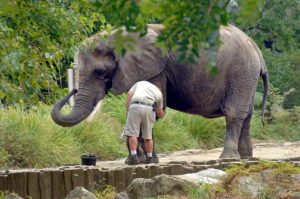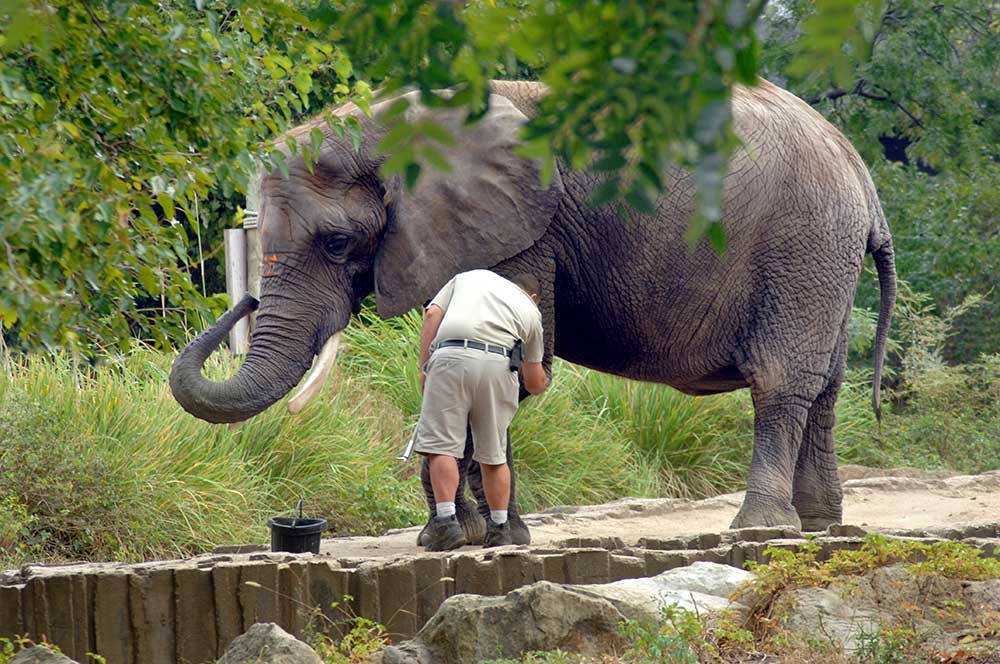Disclaimer: The information on our website is provided for general information purposes only. We make no representations or warranties of any kind, express or implied, about the completeness, accuracy, reliability, suitability or availability with respect to the website or the information contained on our website for any purpose. Any reliance on such information is therefore strictly at your own risk and we are not liable for any damages or losses arising out of or resulting from your reliance on any information contained on our website.
Are you interested in working with animals? Here is a list are jobs that allow you to work with animals on a regular basis and they don’t require a college degree. Landing one of these jobs can also give you experience, enable you to learn from other professionals in the field, and explore other career options you may not have considered.
Watch a video to learn about a career working with animals:
Veterinary Assistant
Did you know that a veterinary assistant doesn’t require a formal education? Many veterinary clinics simply need help with various tasks around their clinic and provide on-the-job training to eager applicants with a strong desire to help animals. You may be required to have a high school diploma and they may want to see previous experience as well. Stop in your local vet clinic and inquire about job openings and ask what qualifications they look for in an applicant so you can get started. To learn more, visit our article on how to become a veterinary assistant.
Animal Control Worker
An animal control worker uses their working knowledge of animal behavior to safely catch and transfer animals. This career can be rewarding but also stressful as some animals are in abusive situations or are in a dangerous predicament. Sometimes, an animal control worker must help capture wildlife or work with exotic pets as well. To learn more, visit our article on what an animal control worker does.
Dog Groomer
Though you don’t have to have a formal education to become a dog groomer, you will need to be trained as grooming is more complicated than you may realize. Different dog breeds have different needs and different styles of cuts a dog owner may prefer. You can find a grooming school to train you up or you can ask your local dog groomer if they take an apprentice to train. They may start you out on simple tasks such as bathing or nail trimming and start to teach you the techniques of the trade. To learn more, visit our article on how to become a dog groomer.
Dog Walker
If you like dogs, are able to be on your feet for long stretches, and don’t mind picking up after them, you may enjoy being a dog walker. You will want to learn a few techniques first though, such as preventing fights among dogs, canine first aid, reading a dog’s body language, and simple obedience commands. This type of job doesn’t even require an application process. Though there are dog walking businesses that may be in need of dog walkers, many dog walkers advertise their services in their local community and gain a client base and work off referrals.
Pet Sitter
Like dog walkers, many pet sitters also advertise in their local area and work off of referrals. Many people prefer to hire a pet sitter who will come to their house (or stay at their house) instead of boarding their animal at a kennel. You can also advertise that you will pet sit all types of animals or specify the types of animals you are most comfortable taking care of. If you do want to pet sit for dogs, learning canine first aid can also set you apart from others that offer this service. It shows you take an animal’s safety seriously.
Pet Store Employee
You can also gain employment at a pet store. Many pet stores have a variety of animals for sale or they offer animal training classes. This can help you learn how to take care of the animals, train them, and learn about the products associated with each type of animal. To learn more about jobs in retail, visit our article, What does a retail salesperson do?
Volunteer Opportunities
You may also be successful volunteering at an animal rehabilitation location or zoo. If you are an animal lover, you may find this rewarding while gaining valuable experience which can help you gain employment working with animals in the future. For instance, the Smithsonian’s National Zoo and Conservation Biology Institution (link opens in a new window) needs volunteers and has positions available for volunteers ages 18 and over. Most of their positions do require a 1-year commitment. They also have a summer volunteer opportunities for students ages 13-17 as well.
Animal Workers Career Video Transcript

From animal shelters to zoos, animal care and service workers look after a wide variety of pets and other non-farm animals. They provide food and exercise, and monitor animals for illness or injury. Groomers work at kennels and pet supply stores to bathe, clip nails, and trim fur, mostly for dogs. Some are self-employed.
Kennel attendants care for pets —usually dogs— when their owners aren’t able to. Pet sitters do similar work, caring for pets at the owner’s, or their own home. Animal caretakers work for animal shelters to provide basic care for homeless pets, and interact with the public about pet health and adoption. Some help veterinarians with medical care.
Grooms look after horses at stables where they exercise and rub down the horses, and clean stalls. Zookeepers tend animals in zoos, either one species, or many different species. Animal care and service workers sometimes face difficult situations such as caring for abused animals or helping euthanize animals. Tasks like moving and cleaning cages or lifting food bags are physically demanding.
Interacting with frightened or aggressive animals contributes to a high injury rate for these workers. Part-time work and irregular hours are common, including evenings, weekends, and holidays.
Animal care and service workers typically need a high school diploma and receive on-the-job training. Many employers prefer candidates who have experience with animals, which is often obtained through volunteering and internships. Zookeepers generally need a bachelor’s degree in a related field.
Article Citations
The career video is in the public domain from the U. S. Department of Labor, Employment and Training Administration.

